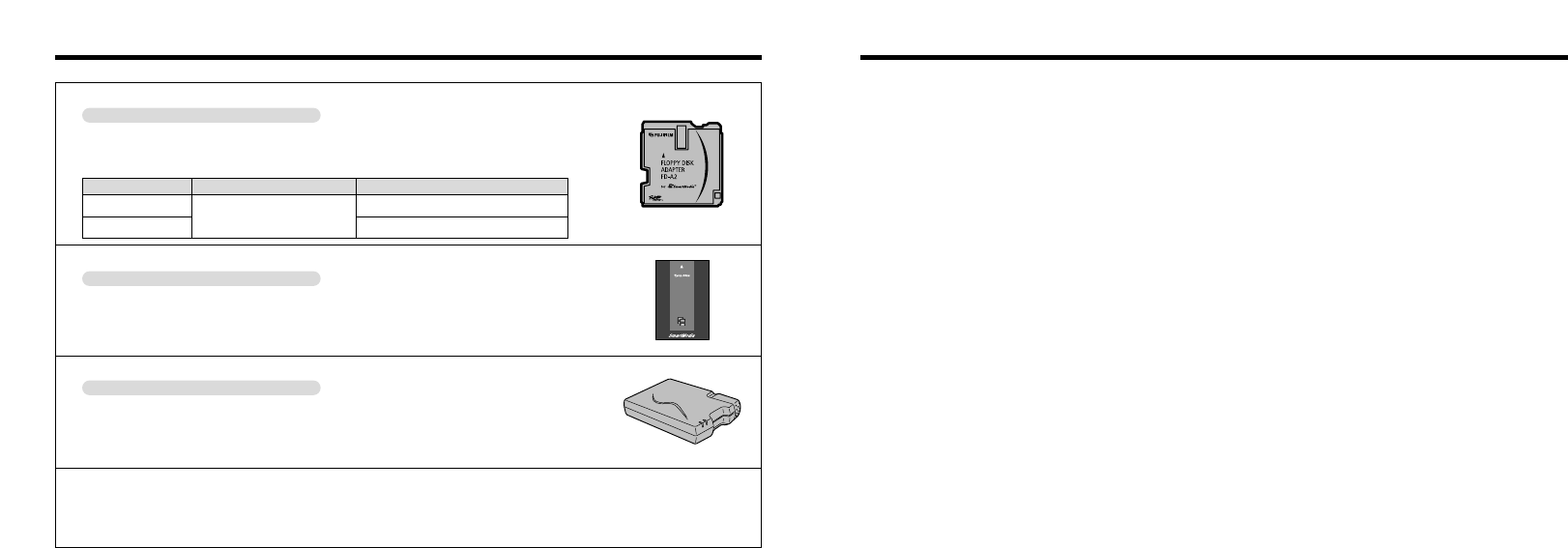
9594
Optional Accessories Guide
PC CARD
ADAPTER
●
SM-R1/R2 Image Memory Card Reader
Cannot be used to store audio files.
The SM-R1/R2 allows images to very easily be read and written from an image
memory card (SmartMedia) to a personal computer. Its USB interface provides
high-speed data transmission.
●
Windows98 or Power Macintosh with USB interface.
●
PC Card Adapter
Cannot be used to store audio files.
The PC Card Adapter allows the SmartMedia to be used as a PC Card Standard
ATA-compliant (PCMCIA 2.1) PC card (Type II).
●
PC-AD2: Compatible with SmartMedia of 5V/3.3V, 2MB to 8MB.
●
PC-AD3: Compatible with SmartMedia of 5V/3.3V, 2MB to 64MB.
●
SC-FX40
This is a special case made of rayon.
This case can be used when carrying the camera to protect it from dust, dirt and
mild impacts.
●
Floppy Disk Adapter
(
FlashPath
)
Cannot be used to store audio files.
This adapter is the same size and shape as a 3.5-inch floppy disk. You can copy the
images on a SmartMedia to your PC simply by loading the SmartMedia into the floppy
disk adapter and then inserting the adapter into your floppy disk drive.
Compatible OS Compatible SmartMedia
FD-A1/A1S/A1N
Windows95/98, NT 4.0
Macintosh
5V/3.3V, 2MB to 32MB
FD
-
A2 5V/3.3V, 2MB to 64MB
Explanation of Terms
AF/AE Lock:
On the FinePix40i, pressing the shutter button down half
way locks the focus and exposure settings (AF and AE
lock). If you want to focus on a subject that is not centered
in the frame or change the picture composition after the
exposure is set, you can obtain good results by changing
the composition after the AF and AE settings are locked.
Auto Power Off Function:
If the camera is not used in any way for two minutes or
more, the Auto Power Off function switches the camera off.
This is to prevent battery depletion and to avoid wasting
power when the camera is connected to the AC power
adapter.
●
The Auto Power Off function does not operate in PC
mode, during automatic playback, or if it is disabled
during setup.
DPOF:
Digital Print Order Format
DPOF is a format used for recording information on a
storage media (image memory card, etc.) that allows you to
specify which of the frames shot using a digital camera are
printed and how many prints are made of each image.
EV:
A number that denotes exposure. The EV is determined by
the brightness of the subject and sensitivity (speed) of the
film or CCD. The number is larger for bright subjects and
smaller for dark subjects. As the brightness of the subject
changes, a digital camera maintains the amount of light
hitting the CCD at a constant level by adjusting the aperture
and shutter speed.
When the amount of light striking the CCD doubles, the EV
increases by 1. Likewise, when the light is halved, the EV
decreases by 1.
JPEG:
Joint Photographics Experts Group
A file format used for compressing and saving color images.
The compression ratio can be selected, but the higher the
compression ratio, the poorer the quality of the expanded
image.
Motion JPEG:
A type of AVI (Audio Video Interleave) file format that
handles images and sound as a single file. Images in the
file are recorded in JPEG format. Motion JPEG can be
played back by QuickTime 3.0 or later.
MP3:
An acronym for MPEG1 Audio Layer 3. Denotes an audio
compression format included in the MPEG video and audio
compression standard. The MP3 format compresses audio
data to approximately 1/10 of its original size by excluding
all audio information that is not audible to humans.
PC Card:
A generic term for cards that meet the PC Card Standard.
PC Card Standard:
A standard for PC cards determined by the PCMCIA.
PCMCIA:
Personal Computer Memory Card International Association
(US).
White Balance:
Whatever the kind of the light, the human eye adapts to it so
that a white object still looks white. On the other hand,
devices such as digital cameras see a white subject as white
by first adjusting the color balance to suit the color of the
ambient light around the subject. This adjustment is called
matching the white balance. A function that automatically
matches the white balance is called an Automatic White
Balance function.


















